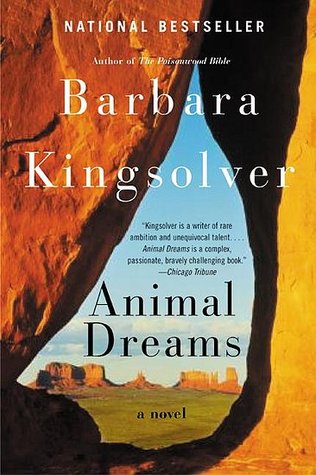 Half Broke Horses, by Jeannette Walls
Half Broke Horses, by Jeannette WallsMy book group selected The Glass Castle for March, and since I had read that book many years ago, I decided to read Half Broke Horses instead.
I loved this true-life novel/biography of Walls' spitfire grandmother, Lily Casey Smith, born in 1903, who was a "mustang-breaking, poker-playing, horse-race-winning schoolmarm of Coconino County, and it wasn't half bad to be in place where no one had a problem with a woman having a moniker like that.”
The book opens with a flash flood, and Lily helps save her younger brother and sister by having them all climb into a tree and clinging to the branches overnight, for dear life, while everything around them is awash in water.
When they wade home through the water the next day, her mom sinks to her knees, thanking their guardian angel for saving them. The way Lily saw it, she was the one who'd saved them:
"There weren't no guardian angel, Dad," I said. I started explaining how I'd gotten us to the cottonwood tree in time, figuring out how to switch places when our arms got tired and keeping Buster and Helen awake through the long night by quizzing them. Dad squeezed my shoulder. "Well, darling," he said, "maybe the angel was you."As an oldest child, this story resonated with me immediately. In crisis as a child, I too rose to the occasion.
Lily was not your typical girl child. She worked side by side with her ranch-running dad, breaking and training the horses. When she was 15, she took off on her horse, solo, for a 30-day journey to Arizona, where she'd landed a job as a teacher in a one-room schoolhouse, even though she'd hardly had any formal schooling herself. (She spent a wonderful semester in a Catholic school, where she thrived, until her dad spent the tuition money to buy some dogs imported from Europe, which were soon shot by a neighbor.)
“Since Mom wasn't exactly the most useful person in the world, one lesson I learned at an early age was how to get things done, and this was a source of both amazement and concern for Mom, who considered my behavior unladylike but also counted on me. 'I never knew a girl to have such gumption,' she'd say. 'But I'm not too sure it's a good thing.'”Lily drove cars and flew planes, and she worked her fingers to the bone, carrying two jobs when she needed to, running a ranch and teaching in her spare time.
“Teaching is a calling too. And I've always thought that teachers in their way are holy - angels leading their flocks out of the darkness.”The irony of reading about her hard work was not lost on me one day, when all I wanted to do was lie in bed reading this book!
“It was good work, the kind of work that let you sleep soundly at night and, when you awoke, look forward to the day.”
“You can't prepare for everything life's going to throw at you. And you can't avoid danger. It's there. The world is a dangerous place, and if you sit around wringing your hands about it, you'll out on all the adventure.”She taught in a polygamist community and taught them about Amelia Earhart and women's suffrage. Soon she received a visit from the polygamist elder, who directed her to stop teaching these things to the children. She refused, and the next time he paid a visit, she prepared for it with her rifle. Of course, her contract wasn't renewed the next year, but it was the children's loss. She stuck to her principles and stood up for justice everywhere, always characteristics I admire!
She raised two children, one of whom was Rosemary Smith Walls, Jeanette Walls' memorable mother.
“God deals us all different hands. How we play 'em is up to us.”Lily was not a fan of Rex Walls, Jeanette's ne'er-do-well, alcoholic husband, but she knew she couldn't stand in her daughter's way. Lily believed in encouraging independence, resilience, and spit and vinegar in her children, a tradition Rosemary carried to an entirely new (crazy) level in her own child rearing.
I loved this book and I would have loved to meet Lily Casey Smith. What a great American hero. This book has been described as Laura Ingalls Wilder for adults, so true for me! Of course, after I finished it, I had to re-read The Glass Castle.


